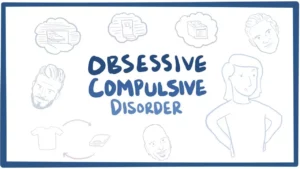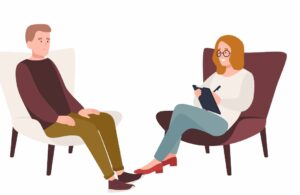If you are one of the millions of people who suffer from OCD, you know that it can be a difficult condition to live with. The good news is that there are treatments available that can help you manage your symptoms. In this blog post, we will discuss the different types of OCD treatment available for adults. We will also provide tips on how to find the right treatment for you.
Contents
What Is OCD?

OCD is a type of anxiety disorder characterized by intrusive thoughts and repetitive behaviors. It’s often referred to as obsessive-compulsive disorder or simply OCD. People with this condition may have strong, intrusive thoughts that become so overwhelming that they feel the need to perform certain rituals and routines to alleviate their anxiety. These compulsions can include washing hands, counting objects, repeating words, avoiding certain numbers or colors, or organizing things a certain way.
When it comes to treating adults with OCD, there are several different approaches available including psychotherapy and medication. In some cases, both treatments may be necessary for the successful management of symptoms.
When Should an Adult Seek Treatment for OCD?
Adults should seek treatment for OCD when they start to experience difficulty performing everyday activities due to their obsessions and/or compulsions. If the person’s thoughts or behaviors are causing distress or impairment in any area of life, such as relationships, work, or social interactions, it is essential to get help.
Some other signs include:
– Excessive worry about contamination or germs, even with no logical reason for it
– Uncontrollable and repeated thoughts that cause distress
– Difficulty controlling impulses or urges to do certain behaviors
– Ritualistic actions or behavior patterns that interfere with daily life
OCD Treatment For Adults
Treating OCD in adults can be a long and difficult process, but it is possible to break the cycle of obsessive thoughts and compulsive behaviors.
There are two main types of treatment for OCD: psychotherapy and medication. Research has shown that combining both methods is more effective than either alone.
Psychotherapy

Psychotherapy is a talk therapy that can help adults with OCD to better understand their condition, recognize patterns and triggers for their symptoms, and confront them in a safe environment. Cognitive Behavioral Therapy (CBT) is the most commonly used type of psychotherapy for treating OCD. It teaches adults how to identify and modify negative thoughts and behaviors associated with OCD.
Exposure and Response Prevention (ERP) is another form of psychotherapy that challenges patients’ obsessive thoughts by exposing them to fear or triggers while teaching them how to resist performing compulsive behaviors in response. This helps slowly reduce the intensity of anxiety experienced when confronted with an OCD trigger.
Another type of therapy for OCD is mindfulness-based intervention. This helps adults become more aware of their thoughts, feelings, and bodily sensations without judgment to better manage OCD symptoms.
Medication
Medication can also be an effective tool for managing OCD. Antidepressants such as selective serotonin reuptake inhibitors (SSRIs) work by increasing levels of serotonin, a neurotransmitter that affects mood, in the brain. SSRI medications typically prescribed for adults with OCD include fluoxetine (Prozac), sertraline (Zoloft), paroxetine (Paxil), escitalopram (Lexapro), and citalopram (Celexa).
Clomipramine (Anafranil) is another type of antidepressant sometimes used to treat OCD. It works differently than SSRIs by blocking the brain’s reabsorption of serotonin and norepinephrine.
In addition to antidepressants, there are other types of medications that can help manage OCD symptoms. These include antipsychotics such as risperidone (Risperdal) or aripiprazole (Abilify), mood stabilizers such as lithium, and anti-anxiety medications like clonazepam (Klonopin).
Lifestyle Changes

Some lifestyle changes can also be beneficial for adults with OCD. Relaxation techniques, such as yoga or meditation, can help reduce symptoms of anxiety. Additionally, regular exercise can help promote overall well-being and improve mood. Avoiding caffeine and getting enough sleep are also important in managing OCD symptoms.
Finally, creating a therapeutic space in the home can be useful for creating a safe environment to practice healthy coping skills and manage anxiety. This might include setting aside time each day to do calming activities like reading or drawing or writing down worries and fears to confront them more easily.
Support Groups
An important part of managing OCD has a support system. Joining an online or in-person support group for adults with OCD can help participants feel less alone and provide them with the tools to effectively manage their symptoms.
Some support groups have facilitators who can offer guidance and advice, while others are peer-led and provide a safe space to discuss personal experiences. Talking with other adults who understand what it’s like to live with OCD can be a valuable resource for managing symptoms.
Getting treatment for OCD in adults is an important step in breaking the cycle of obsessive thoughts and compulsive behaviors. With the right combination of psychotherapy, medication, lifestyle changes, and support groups, adults can learn to manage their OCD and lead healthier lives.
How Do Adults Select OCD Treatment Methods?

The selection of OCD treatment methods should be tailored to the individual, taking into consideration their specific symptoms, preferences, and lifestyle.
These factors for selecting an OCD treatment plan are typically discussed between the patient and the mental health provider. It is important to note that no single treatment works for every adult with OCD. These are as symptoms vary from person to person.
Some of these are:
Signs
One of the first steps in selecting the best OCD treatment plan is to identify the signs and symptoms of the disorder. An accurate diagnosis is important for finding the most effective treatment approach.
Cost
An important consideration when selecting an OCD treatment plan is the cost of treatment. This can include both medical costs for medications, and psychological or therapeutic services.
Side Effects
When choosing between treatments, it is important to consider any potential side effects. These may be associated with certain medications or therapies. Knowing what to expect from each type of treatment will help patients make informed decisions about their care.
Availability
The availability of OCD treatments is another factor to consider when selecting a treatment approach. It is important to note that some types of treatments may not be available in certain areas, and that accessibility should always be taken into account. This is when deciding on a course of action.
Overall Goals
Ultimately, the goal of any OCD treatment plan should be to help individuals manage their symptoms and improve their overall quality of life. Working with a mental health professional is essential to find an individualized treatment plan. These can meet the patient’s specific needs and goals.
When starting an OCD treatment plan, it is important to remember that progress will likely be gradual. It may take some time before the desired results are achieved. Also, adults need to have realistic expectations about what can be accomplished through treatment. It remain consistent in taking any prescribed medications or engaging in therapy sessions.
Conclusion
OCD is a complex and challenging disorder, but it is treatable. With the right combination of medication and psychotherapy, adults with OCD can manage their symptoms and lead happier lives. Medication helps to reduce intrusive thoughts while cognitive-behavioral therapy helps people learn how to cope with their obsessions and compulsions healthily. Additionally, support groups provide an outlet for those struggling with OCD to connect with others on the same journey. By engaging in these treatments, individuals can take back control over their lives from OCD and live fuller, happier lives.
For more information and guidance, please contact OCDMantra. OCD is a mental health disorder characterized by obsessions and compulsions. If you have any queries regarding OCD treatment, ERP therapy experienced therapists at OCDMantra can help: Book a trial OCD therapy session


